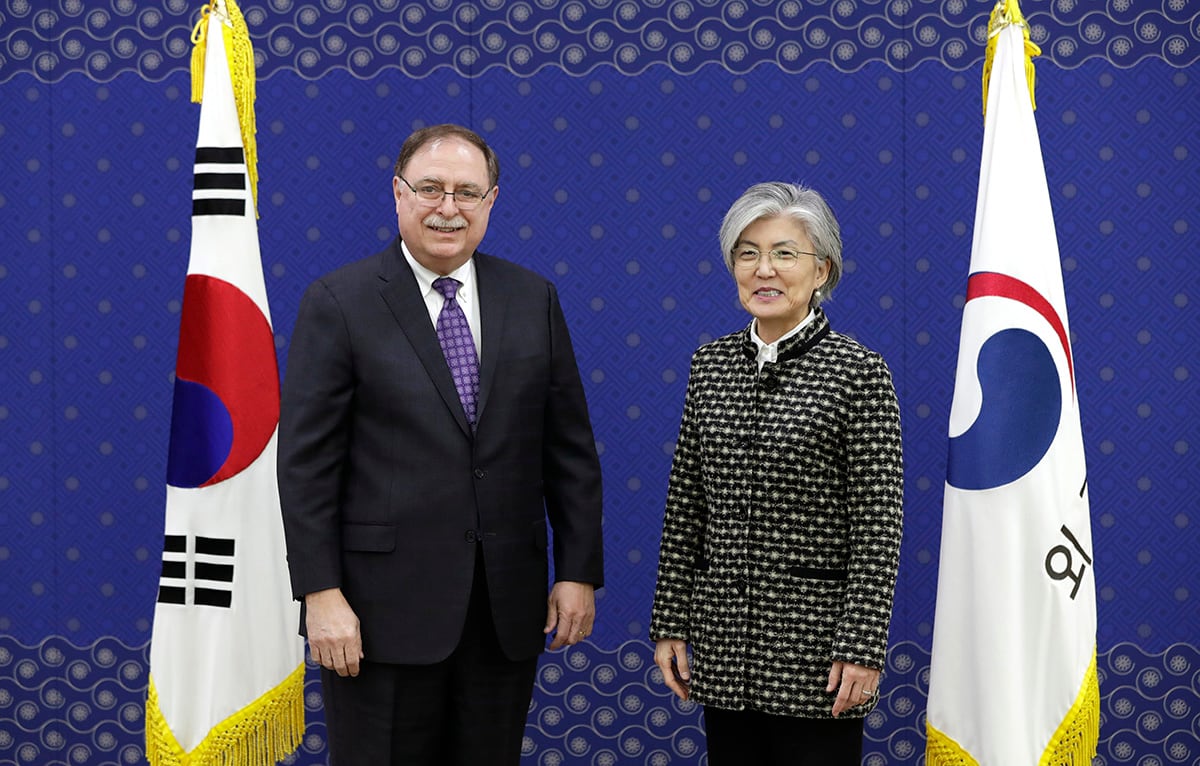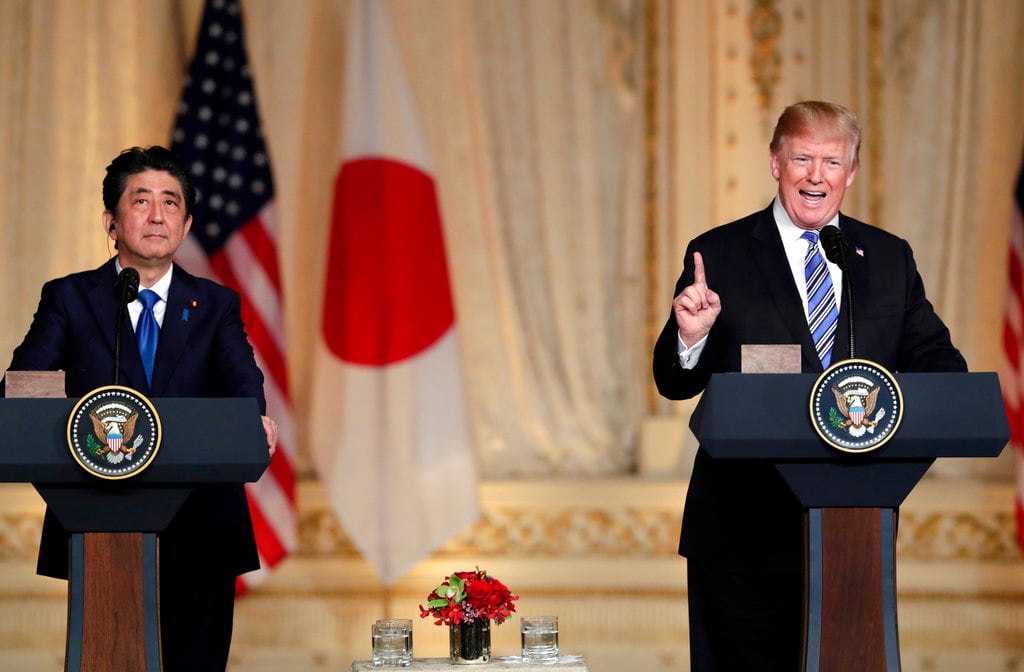Japan hosts approximately 54,000 U.S. troops, but experts argue complications that may arise during upcoming host nation support negotiations could shake up the current landscape and undermine readiness of U.S. troops.
Every year, Japan provides host nation support to offset costs of keeping U.S. troops in Japan. U.S. negotiations are expected to begin soon because the current arrangement will expire in March 2021. But experts contacted by Military Times believe the Japanese are likely bracing themselves for testy discussions with the U.S. over the amount of host nation support they provide.
“[The] Japanese are anticipating that this is going to be a problem with Trump,” Daniel Sneider, a lecturer in international policy at Stanford University, told Military Times.
The issue is attracting scrutiny in light of President Donald Trump’s recent decision to pick a fight with Japan over the U.S.-Japan security alliance.
The alliance, which was first signed in 1951 and then updated in 1960, requires the U.S. to defend Japan if it is attacked. The agreement also provides the U.S. bases in Japan, allowing the U.S. have a forward deployed aircraft carrier strike group in Yokosuka, Japan. Despite the national security advantages for the U.S., Trump believes the alliance is “unfair.”
“I said, look, if someone attacks Japan, we go after them and we are in a battle, full force, in effect,” Trump said after the G-20 summit during a news conference in June. “If somebody should attack the United States, they don’t have to do that. That’s unfair.”
Trump also said he told Japanese Prime Minister Shinzo Abe that the alliance must be revised, but claimed he wasn’t interested in withdrawing from it. Japan’s constitution also bars war as a “sovereign right” of Japan, although Japan has stepped up and worked within its limits to allow its Self Defense Forces to support allies in some overseas operations.
It’s unclear how the president envisions modifying in the alliance or what he would want changed, leaving the remarks up for interpretation to experts and others. The White House did not respond to a request for comment for clarification from the Military Times.
“I think what the president was trying to say was that allies of the United States need to invest more in defense and enhance their capabilities so that the burden on the U.S. military can be reduced,” said Nicholas Szechenyi, a senior fellow at the Center for Strategic and International Studies.
Rather than completely overhaul the U.S.-Japan security alliance, Szechenyi said he expects host nation support “will also become a contentious issue in the U.S.-Japan alliance.”
As a result, Japanese policy makers anticipate the Trump administration will exert pressure to gain concessions from Japan on economic and burden sharing issues, said Zack Cooper, a research fellow at the American Enterprise Institute.
According to the current host nation support agreement that was approved in 2016, Japan is required to pay approximately $1.8 billion in host nation support each year. Japan also pays approximately $1.65 billion each year on measures designed to subsidize base-hosting communities, per a June 2019 Congressional Research Service report.
Conversely, the U.S. has paid roughly $1.9 billion to $2.5 billion per year on nonpersonnel costs “in recent years,” the Congressional Research Service report said, citing the Department of Defense Comptroller.
RELATED

Expected negotiations over host-nation support Japan come after the U.S. wrapped up a host-nation support agreement with South Korea in February 2019, following arbitrations experts labeled “contentious.” The one-year agreement ultimately resulted in South Korea paying $70 million more than it did the previous year. In the past, host nation support arrangements typically spanned the course of five years, but South Korea and the U.S. now must tackle the issue annually.
However, hashing out renewals each year will negatively impact troops overseas and will jeopardize readiness of troops, Szechenyi said when asked about the ramifications of the U.S. and Japan also adopting annual agreements.
“Repeated negotiations over host nation support could generate uncertainty about U.S. troop deployments and affect planning and readiness,” Szechenyi said.
Sneider also warned complications stemming from host nation support would pose additional challenges in managing troops overseas.
“I think the pressures on host nation support with both Korea and Japan will not lead immediately to reduction of troop levels, particularly in Japan," Sneider said. “But they will make it more difficult to manage our force presence since the funding supports the bases in very important ways, such as paying for the local work force that maintains the bases.”
"And more deeply, a nasty fight over host nation support payments will call into question the reliability of our security alliances,” Sneider added.
Cooper believes Japan is prepared to renew the host nation support agreements annually, but noted controversy surrounding a renewal could emerge if the U.S. asks for an absurd contribution from Japan, or Trump continually bashes Japan in public and threatens to withdraw U.S. troops or end the alliance.
“If, however, there are serious questions about renewal in the next year — or if President Trump is re-elected in 2020 — then I would expect the U.S. military to start considering possible options for force drawdowns in Northeast Asia,” Cooper said.
Although Cooper is doubtful the situation will escalate in that manner, he does expect Trump will take a series of actions in the near future, including threatening to decrease U.S. military support to Japan, and either threatening or actually imposing tariffs on automobiles.
On the economic front, Sneider said the Japanese have interpreted Trump’s critical comments about the treaty as solely a negotiating tactic in trade discussions that are expected later in 2019.
A high-ranking Japanese Defense Ministry official expressed similar sentiments.
“My take is that Trump does not have the intent to overhaul the treaty, but aims to win a big concession from Japan in bilateral trade talks by linking the defense issue to trade,” the official said, according to Asahi Shimbun.
According to media reports, trade was a topic of discussion for the two leaders when they met in May and in June. The two leaders are also slated to meet next in September to discuss a trade agreement.
Szechenyi said he didn’t anticipate “radical proposals” revamping the foundation of the U.S.-Japan security alliance, but said such statements from Trump still present red flags.
“It’s important to avoid the kind of rhetoric that the president is using because China and North Korea would like nothing more than for the U.S.-Japan alliance and other alliances in Asia to weaken,” Szechenyi said.
“The rhetoric damages both U.S. interests and Japanese interests because it could provoke China and North Korea,” Szechenyi added. “So this is going to be a challenge going forward.”




